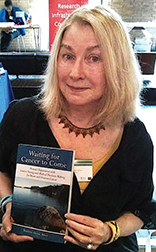
By
Professor of Sociology Sharlene Hesse-Biber has been recognized by Alpha Sigma Nu, the honor society for Jesuit higher education institutions, with a 2015 Alpha Sigma Nu Book Award for her book, Waiting for Cancer to Come: Women’s Experiences with Genetic Testing and Medical Decision Making for Breast and Ovarian Cancer.
Hesse-Biber’s publication is one of only four winners, representing the 31 Jesuit colleges and universities in the United States, Canada and South Korea. This year’s awards recognize excellence in publishing in the sciences.
Waiting for Cancer to Come tells the stories of women who have tested positive for the BRCA1/BRCA2 gene mutations, which indicate a higher risk of developing breast and ovarian cancer. Using the voices of the women themselves to describe the under-explored BRCA experience, Hesse-Biber highlights the emotional, social, economic and psychological factors at play in women’s decisions about testing and cancer prevention.
“I want to share this book award with all the women in my research study who have related to me their inspiring genetic testing and hereditary cancer narratives,” said Hesse-Biber. “Thanks to Alpha Sigma Nu for their recognition of my work and my heartfelt appreciation to Boston College for their ongoing research support that spurs me to continue along my research path.”
[Hesse-Biber discussed her book in a 2014 Boston College Chronicle story, available at http://bit.ly/1zgKcgk]
The judging panel described Waiting for Cancer to Come as “beautifully written, with serious attention to science and a welcome focus on the inevitably ethical dimensions of scientific progress and the role of politics and economics in shaping it.”
Established in 1979, the Alpha Sigma Nu Jesuit Book Awards recognize outstanding publishing achievement at Jesuit colleges and universities in the humanities, the sciences, and professional studies. Books are judged on the basis of scholarship, significance of the topic and its continuing importance to scholars in several disciplines, mastery of extensive literature, research findings, authority in interpretation, objectivity and readability.



